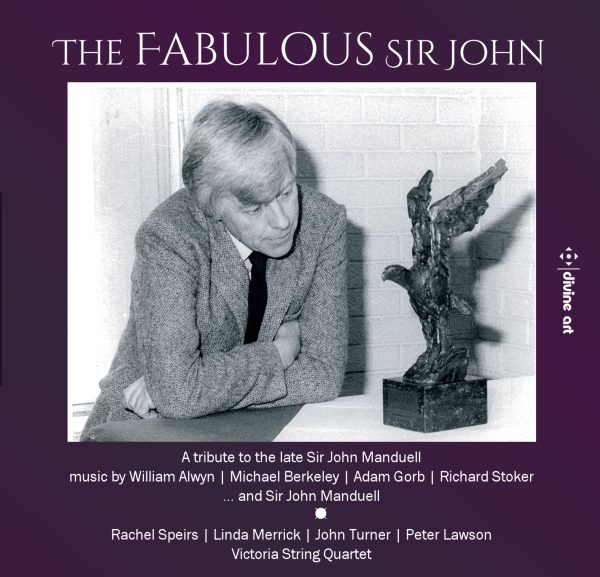For the RNCM 50th Anniversary
This is by no means the first CD of tributes to Sir John Manduell, CBE, Founding Principal of the Royal Northern College of Music, but is the sequel to Songs for Sir John (Divine Art DDA 25210, released 2020) and gives us nearly 38 minutes of his own music. All this is thanks to the equally fabulous virtuoso recorderist John Turner, who has initiated numerous recordings of music of our time, often, but by no means always, featuring his own instrument in combination with a variety of chamber ensembles – in this case the Victoria String Quartet along with soprano Rachel Speirs, clarinettist Linda Merrick, pianist Peter Lawson and of course John Turner himself.
Perhaps as an indication of the breadth of Sir John’s involvements, all four of the other composers knew him independently of his rôle as Principal of the RNCM, and this beautifully compiled disc shows, in the way their music relates to that of Manduell’s, what a remarkable student, friend and colleague he was. Two living composers: Adam Gorb and Michael Berkeley, frame the eight tracks of Manduell’s music in a beautiful and elegant manner, each in his own striking way.
Adam’s Aria for Sir John seems almost to call out to the listener with a little word-like, or name-like gesture. He tells me that it was intended as a tribute to both Johns, but John Turner added the ‘Sir’ to re-direct its intention!
Not being a critic or even a journalist, I don’t feel it would be right for me to evaluate, let alone highlight, any of the individual pieces on this disc – they all have their own fine, individual qualities. However, regarding Sir John’s, I shall venture a few observations since I’ve known his music for many years. It has individuality of a remarkable and personal kind. What’s clear from what we hear on this disc is that it doesn’t fall into one stylistic category, but into a range of related styles, none of which follows a fashion. But different in style and character though each piece sounds, there are subtleties which unify them, which are most obvious in the Trois Chansons de la Renaissance. There’s a gentle humour, a special sense of timing, a harmonic language which is rather more modal than tonal within phrases but with a hint of key at cadences, and an elegant shaping of the phrases overall.
His Elegy for string quartet is a richly-expressed tribute to the late Christopher Rowland, formerly leader of the Fitzwilliam String Quartet, who before that led the Sartori Quartet in John Manduell’s department at Lancaster University. So the first violin really stands out here!
Recitative and Aria for duo of violin and viola – very expressive but with ‘wit’ – was written in memory of composer, writer and BBC colleague, Peter Crossley-Holland.
Trois Chansons de la Renaissance for soprano and piano are settings of early-French poems, which Rachel Speirs and Peter Lawson perform with clarity and gentle humour. Sir John was a great francophile, as shown in the gentle pastiche in at least one of the songs, and in the correct word-shaping in all three.
Bell birds from Nelson for solo recorder, I’m happy to say, is a beautiful 70th-birthday tribute to myself, recapturing the song of birds Sir John heard on a visit to New Zealand.
Nocturne and Scherzo, for clarinet and string trio, is the longest piece on this disc, lasting well over 11 minutes. The slight ambivalence of the Nocturne, as though the dreamer is desperate to get going, is beautifully brought out by clarinettist Linda Merrick with Benedict Holland, Kim Becker and Jennifer Langridge, and the way they recapture the faint ambivalence in the Scherzo shows great understanding of Sir John’s intention, which was seemingly that the two movements are really just one.
Tom’s Twinkle, for recorder and piano, has a humour which matches that of the title.
To complete the frame around Sir John’s fascinating pieces, we have Michael Berkeley’s A Dark Waltz for recorder and string quartet. Michael had known Sir John for decades, so this brief tribute, containing hints of Hebrew chant (chants are a feature of much of Michael’s music), is deeply personal. John Turner and the Quartet bring out the feeling of a prayer for peace (or Shalóm?) beautifully.
Next, as a ‘historical’ background, there follow five Songs of Innocence for soprano and string quartet by Manduell’s first Composition teacher, William Alwyn, and a piece for recorder and string quartet by his co-student, Richard Stoker. The Alwyn songs are what could be thought of as ‘roots’, stylistically, of Sir John’s own musical ‘trees’.
- The Ecchoing Green (sic) – another waltz, perhaps looking back a little;
- Spring now looks forward, brightly and tenderly;
- The Divine Image has the feel of a hymn;
- Laughing song is jerky and jolly, and
- Nurse’s Song has hints of rebellion, perhaps relating to a Manduell Alwyn knew, as I feel all five of these songs do, in their different ways.
Finally, as a gentle ‘coda’ to the whole CD, which is really a composition in its own right, we have Richard Stoker’s Memento Mary Magdalene, for recorder and string quartet, a six-minute piece of great beauty. Here, we hear not only the recorder ‘singing’, but also the viola.
The playing and singing on the whole album are completely compelling, showing a very strong and convincing sense of engagement. I do hope another one follows, perhaps this time featuring RNCM composers from the 1973-96 ‘Manduell’ era?
@divineartrecordingsgroup
Search
Newsletter
A First Inversion Company
Registered Office:
176-178 Pontefract Road, Cudworth, Barnsley S72 8BE
+44 1226 596703
Fort Worth, TX 76110
+1.682.233.4978












